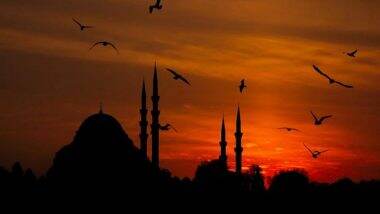New Delhi [India], March 17 (ANI): Shab-e-Barat, which is also known as the "night of forgiveness," is observed between the 14th and 15th night of the Sha'aban, the eighth month in the Islamic Calendar. This year, the celebration of this auspicious Muslim festival will commence on the evening of March 18 and end on the evening of March 19.
This occasion is celebrated with great fervour all over South Asia, including in India, Pakistan, Bangladesh, Sri Lanka, Azerbaijan and Turkey and Central Asia including Uzbekistan, Tajikistan, Kazakhstan, Turkmenistan and Kyrgyzstan.
The word 'Shab' has Persian origins and it means night while 'Barat' is an Arabic word that stands for salvation and forgiveness. On the night of Shab-e-barat Muslims all around the world ask forgiveness for their sins from Allah.
"The day is believed to be extremely pious, for it is said that the Almighty readily forgives those who pray sincerely, and ask for their sins to be washed. Additionally, the night can be used to seek mercy for the deceased and ill family members. It is also believed that on this night, Allah decides people's fortune for the year ahead, their sustenance and whether they will have the opportunity to perform Hajj (pilgrimage)," said Muhammad Abbasi, Noorul Islam Niswan School, Lucknow.
Also Read | RRR: Andhra Pradesh Govt to Fix Special Ticket Prices for SS Rajamouli's Film.
Although the main prayers and Holy Quran recitations start at night, the vibrancy and festiveness start as soon as the day commences. Muslims across the world celebrate the occasion differently depending upon cultural diversity and local traditions.
The history of this festival dates back to the time when the twelfth Imam of the Shia Muslims named Muhammad al-Mahdi was born. The night of Shab-e-Barat is celebrated as his birthday. On the other hand, the Sunni Muslim community believes that on this day only, God saved the Ark of Noah from the flood. This is why people across the globe celebrate the day.
Shab-e-Barat has an 'energy' of its own and people have their own distinct story about this day. During daytime, people prepare delicious sweets, Halwa, Zarda and other things to enjoy and distribute among their neighbours, relatives, family members and poor people. Many also visit the graves of their loved ones to pray for eternal peace of the souls. Some also fast on Shab-e-Barat.
Mosques are decorated and many of them have periodic recitations and announcements throughout the day, before preparing for the main events of the night.
Maulana Hamid Bilgrami, Panjetani Masjid, Lucknow, explained, "After sundown on Shab-e-Barat, Muslim devotees start their prayers with 'Isha Ki Namaz'. The prayer session continues for the entire night and till the next day before the azaan, they eat Sehri. The fast for Shab-e-Barat starts is observed after that."
In conclusion, the literal meaning of Shab e Barat can be translated to the night of Atonement. It has numerous names as per the different cultures worldwide, such as Cheragh e Barat, Barat Night, Berat Kandili, or Nisfu Syaaban. Due to the virtues of the night, it is one of the holiest nights in Islam. (ANI)
(This is an unedited and auto-generated story from Syndicated News feed, LatestLY Staff may not have modified or edited the content body)













 Quickly
Quickly

















